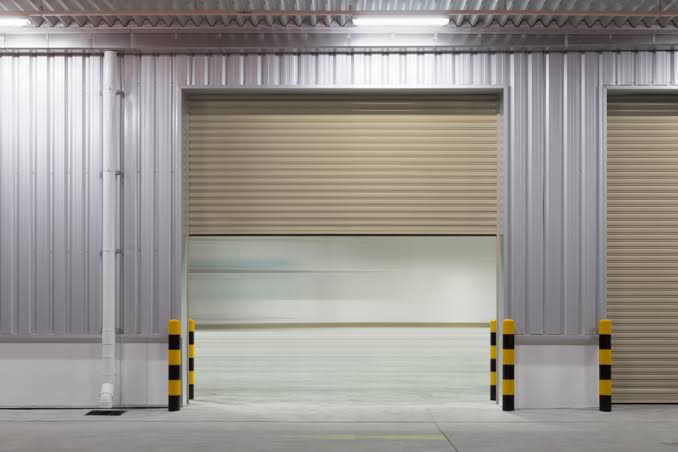When it comes to selecting the best commercial garage doors for your business, quality, durability, and security are crucial. High quality commercial garage doors not only enhance the functionality of your facility but also improve the overall safety and energy efficiency of your building.
In this article, we’ll explore what makes a garage door “high-quality,” the different types of commercial doors available, and the essential factors to consider when making your choice.
Understanding Commercial Garage Doors
What Are Commercial Garage Doors?
Commercial garage doors are built to handle heavier usage and more demanding environments compared to residential doors. They are often found in warehouses, loading docks, fire stations, and large commercial spaces. These doors are engineered to provide security, withstand harsh weather conditions, and allow for the smooth and efficient flow of goods and vehicles.
Why Quality Matters
For a business, a malfunctioning or low-quality garage door can disrupt operations, lead to costly repairs, and compromise security. High-quality commercial garage doors are designed to last longer, operate more efficiently, and offer enhanced safety features. In addition, investing in a high-quality door can reduce the need for frequent maintenance and save you money in the long run.
Types of High-Quality Commercial Garage Doors
There are various types of commercial garage doors, each designed to suit different business needs. Here’s an overview of the most popular options:
1. Overhead Doors
Overhead doors are one of the most common types of commercial garage doors. They are mounted on tracks that run parallel to the ceiling and are ideal for spaces with high ceilings. These doors are easy to operate and can be opened manually or with an automatic opener.
- Materials: Steel, aluminum, and insulated panels are commonly used for overhead doors.
- Benefits: They are durable, space-saving, and can be insulated to improve energy efficiency.
2. Roll-Up Doors
Roll-up doors are designed for tight spaces where ceiling clearance is limited. These doors coil into a compact roll above the doorway and are frequently used in storage facilities, warehouses, and loading docks.
- Materials: Typically made of steel or aluminum slats.
- Benefits: They are space-efficient, highly durable, and require minimal maintenance.
3. Fire-Rated Doors
Fire-rated commercial garage doors are essential for businesses where fire safety is a priority. These doors are designed to automatically close in the event of a fire, helping to contain flames and smoke. They’re usually built and installed by specialized companies that understand the ins and outs of fire door manufacturing and installation, as well as safety; so you know you’re in good hands.
- Materials: Usually made from steel or other fire-resistant materials.
- Benefits: They offer enhanced safety features, fire containment, and are built to comply with fire safety regulations.
4. Sectional Doors
Sectional doors are composed of multiple horizontal panels that open vertically, allowing for a clean overhead clearance. These doors are ideal for businesses with large openings, such as car dealerships and warehouses.
- Materials: Often made of steel, aluminum, or insulated panels.
- Benefits: They provide excellent insulation, security, and can be customized with windows for additional visibility.
Key Factors to Consider When Choosing Commercial Garage Doors
Now that you know the types of commercial garage doors available, it’s important to understand the factors that will influence your decision. Here’s what you need to keep in mind:
1. Durability
Commercial garage doors need to withstand frequent use, harsh weather conditions, and potential impacts. Steel and aluminum doors are known for their durability, with insulated steel offering extra strength. Additionally, look for doors with corrosion-resistant coatings to ensure longevity.
2. Security
Security is a top priority for any commercial establishment. High-quality garage doors should feature strong locking mechanisms and reinforced materials to prevent unauthorized entry. Some doors also come with built-in alarm systems for added protection.
3. Insulation
For businesses that require climate control or are located in areas with extreme temperatures, insulated garage doors are a must. Insulation helps regulate the temperature inside the facility, leading to lower energy costs and improved working conditions.
4. Ease of Operation
High-quality commercial garage doors should be easy to operate, whether manually or with an automatic opener. Automated doors are especially beneficial for businesses that require quick and efficient access, such as loading docks and warehouses.
5. Size and Design
The size of your garage door should match the requirements of your business. Measure the space accurately to ensure the door fits properly. Additionally, consider the design and aesthetics, as a well-designed door can enhance the overall appearance of your building.
6. Maintenance Requirements
Some commercial garage doors require more maintenance than others. High-quality doors are typically built with fewer moving parts, reducing the need for regular maintenance. Look for models with warranties that cover both parts and labor for added peace of mind.
Installation Process for Commercial Garage Doors
The installation of a commercial garage door should be handled by professionals to ensure that the door operates safely and efficiently. Here’s a step-by-step overview of what to expect during the installation process:
1. Pre-Installation Inspection
Before installation begins, the technicians will conduct an inspection of the site to ensure the door fits properly and meets your specific needs. They will measure the opening and assess the structure to determine the best type of door for your facility.
2. Removing the Old Door (if applicable)
If you are replacing an existing door, the technicians will safely remove it, ensuring that the structure is not damaged during the process.
3. Preparing the Opening
The opening where the new door will be installed is then prepped. This may involve adjusting the tracks, securing brackets, and ensuring that the area is clear of obstructions.
4. Installing the New Door
The new commercial garage door is carefully installed, with each panel being mounted and secured in place. The tracks and rollers are aligned to ensure smooth operation.
5. Adding the Opener (if applicable)
If your garage door includes an automatic opener, it will be installed at this stage. The opener is connected to the door and tested to ensure it operates correctly.
6. Testing and Final Adjustments
Once the door is installed, the technicians will test it multiple times to ensure it opens and closes smoothly. They will also make any necessary adjustments to the springs, tracks, and opener to ensure optimal performance.
7. Final Inspection and Clean-Up
After installation, the team will conduct a final inspection to verify that everything is working properly. They will also clean up the area, removing any debris from the installation process.
Conclusion
Investing in top-rated commercial garage doors is a smart decision that will improve the security, efficiency, and functionality of your business. With various types of doors available, including overhead, roll-up, fire-rated, and sectional doors, it’s important to choose one that suits your specific needs. By considering factors like durability, security, insulation, and ease of operation, you can make an informed decision that will benefit your business in the long run.






